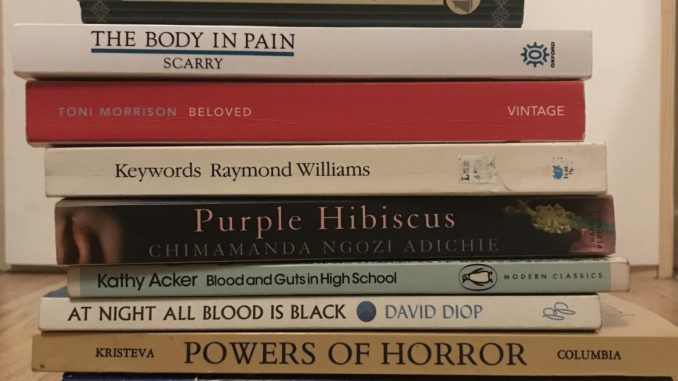
‘English’ is a degree that conjures up a lot of generalised preconceptions. Whilst some of these are certainly true (funnily enough, you will have to do a LOT of reading), I’d like to give you an insight into what studying English is really all about. I’m a third-year English BA student here at King’s and I have thoroughly enjoyed my degree so far. There are a lot of misconceptions that tend to be attached to an English degree, which I intend to break down to show you that it entails more than what meets the eye….
The first and biggest misconception that is often attached to studying English is that it’s all canonical texts. Don’t get me wrong, you will study the classics, such as Shakespeare, Chaucer, Austen, Shelley and Joyce, but there is also so much more that is covered. Your first year will consist of studying a lot of these authors alongside literary theory, poetry, American literature and the contemporary. However, in the following years you have more freedom to explore and choose modules that align with your own literary interests. If you’re like me, the atypical English student who hates studying classical and canonical literature, the English department offers a lot in terms of contemporary and lesser-known texts. I’ve explored experimental theatre, performance art, the Afro-Gothic, film, media… the list is endless. Throughout my degree, I discovered a love for the weird, grotesque and frankly absurd forms of literature and theatre that I would never have found if it was not for King’s! This is not to say that you can’t focus on the classics, as you can certainly choose modules to tailor your degree to your interests.
To further this, an English degree is not just about reading books. English is very much an inter-disciplinary degree. You will cover media, history, philosophy, linguistics, creative writing, theory, art, politics and psychology to name a few. As a result, you don’t just learn how to analyse literature but become more culturally and historically aware. The vast array of topics that you will cover equip you with a vast skill set and a ton of knowledge that is beneficial to a wide range of careers.
There is also the dreaded stereotype that lingers over English students: the assumption that we all are going to become (and want to become) teachers. Whilst this is one example of a career you could pursue after your degree, this does not mean you have to. As an English degree gives you a wide array of skills like communication, analysis, creativity, organisation and articulation, the career opportunities are much broader than you may have first thought. Many English graduates have gone on to find jobs in editing, publishing, journalism, marketing and the arts. There is also the possibility of completing a conversion course following your degree if you love English but decide it’s not the career path for you. Students have also gone on to find jobs in teaching, law, finance, HR and business following further study.
Now back to the degree itself. Another misconception is that you are expected to write like the next literary theorist. Actually, this is the opposite of what your lecturers want. Nobody wants to read a dense essay full of extremely complex language, where the argument isn’t clear. One of the biggest pieces of feedback I received in first year was to avoid using superfluous language or terms I didn’t fully understand. Lecturers want you to write clearly and concisely so there’s no need to be attempting to write like Derrida or Foucault!
A lot of students also feel the pressure to complete all the reading for every single class. Quite honestly, this can both be a waste of time and unmanageable. This is not to say that you shouldn’t make an attempt to engage with the material but rather to consider if it’s going to be useful to you in the long run. My advice would be to read as much of the primary reading for each week as you can so that you can participate in seminars and gauge if you’re interested in it. If it’s not a text that you’re interested in writing about for your mid-term or end of term essays, then it is not worth doing the extra or second reading. Rather, you could manage your time better by spending more time on the topics and texts from that module that you’d like to write about – the more reading you do around the subject, the stronger your essays will be!
Finally, English is a degree with minimal contact hours. This means that compared to other subjects, you will spend less time in lecturers and seminars and more time on independent reading and research. Therefore, you must be self-motivated and able to work independently. As you will have less timetabled classes, you need to create a structure for yourself so that you don’t fall behind. It can be very easy to waste the day binge-watching a new show on Netflix or allowing yourself to sleep in. Creating a routine can help you to manage the workload and help you to succeed!
Written by Faye Elder, 3rd Year English

Leave a Reply